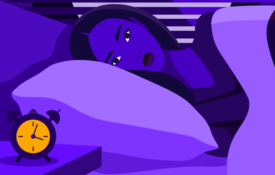-
COVID-19 Deniers Are Still All Too Real. Here’s How We Can Convince Them
COVID-19 has killed 250,000 Americans and counting. We’re nine months into the pandemic, and our infection rates are worse than ever. A majority of people across the political spectrum acknowledge the danger of COVID-19. But research has found there’s still a large political divide, as Republicans are less likely to believe science and wear masks. With months to go before a vaccine is widely deployed, there’s still time to change minds and save lives that would otherwise be lost to COVID-19 denial. But how? ...
-
How To Help Your Kids Reframe Their Anxiety — And Reclaim Their Superpowers
Every child feels anxious at times — but for some, that feeling persists and interferes with friendships and schoolwork. It can cause children to be fearful, worried, irritable and angry. And there are physical symptoms: Kids can feel tired and have headaches, stomachaches and trouble sleeping. Anxiety is one of the most common mental health concerns for children. ...
-
Your Brain Is Not for Thinking
APS Past-President/ Author: Lisa Feldman Barrett Five hundred million years ago, a tiny sea creature changed the course of history: It became the first predator. It somehow sensed the presence of another creature nearby, propelled or wiggled its way over, and deliberately ate it. This new activity of hunting started an evolutionary arms race. Over millions of years, both predators and prey evolved more complex bodies that could sense and move more effectively to catch or elude other creatures. Eventually, some creatures evolved a command center to run those complex bodies. We call it a brain. ...
-

New Content From Current Directions in Psychological Science
A sample of articles on cultures of sustainability, cognitive-bias modification to treat addiction, probabilistic biases, cognitive training, the development of working memory, acquisition of fears and phobias, and a sleep-and-memory research program.
-

New Research in Psychological Science
A sample of research on the effect of smartphone use on academic performance, memory for stressful events, posture and Stroop effect, immunity and cognition, number perception, decisions in loss and gain domains, the protective effect of positivity on memory decline.
-

Losing Control: How Lack of Sleep Allows Unpleasant Thoughts to Intrude
Unwanted memories can intrude on our thoughts from time to time, but new research suggests that a lack of sleep can greatly impair our ability to suppress these unpleasant and unwanted thoughts. Researcher Scott Cairney

